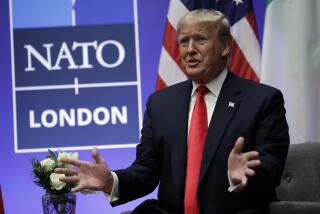Don’t Go It Alone : America’s support for U.N. action might not be sustained if Yanks remain the bulk of forces on the ground.
- Share via
During the two decades before the dismantling of the Berlin Wall, the issue of burden-sharing threatened to undermine America’s commitment to maintain troops in Western Europe to deter a Soviet attack.
American taxpayers were concerned that we seemed to be spending more for Europe’s defense than were the European members of the North Atlantic Treaty Organization. That issue has now been defused within NATO, thanks to negotiations to reduce both American and Soviet forces on the Continent. But it may well reappear in connection with the defense of Saudi Arabia and the Persian Gulf oil fields.
President Bush deserves credit for enlisting friends and allies around the world to join us in committing forces to halt further aggression by Iraq’s Saddam Hussein. Yet the actual deployment of forces from those countries so far is dwarfed by the huge American air, naval and ground forces that are pouring into the Persian Gulf area. Particularly lacking in sufficient numbers are forces that can’t fly away or sail away when and if a shooting war begins--namely, ground forces in Saudi Arabia.
Ground forces are the heart and soul of any credible military operation. They measure the depth of the political commitment to defend against aggression. Americans have rallied around their President, supporting his call to uphold international law and prevent a ruthless despot from gaining a stranglehold on the world economy through domination of Persian Gulf oil. But how long will that support be sustained if the United States is the only country willing to put at risk a sizable ground force to defend the entire world’s interests?
Just as the United States no longer dominates the world economy or the international institutions charged with maintaining global economic health, we should not continue to dominate in providing the military muscle to counter threats to the world economy.
That is not a sustainable condition. Economic strength is far more evenly spread around the globe than it was when the Marshall Plan and NATO were created. Americans know this. Western Europe, Japan and other nations have now attained high levels of prosperity. Americans expect these new economic powers to bear a fair share of the effort to defend that prosperity. But so far, they are not doing that in the Persian Gulf.
The United States is spending $1 million an hour to dispatch forces to the Middle East. That figure will escalate quickly as troop levels rise; it will skyrocket in the event of hostilities.
In 1950, Americans were willing to almost single-handedly wage the United Nations’ war against North Korean aggression. They understood that only the United States was militarily and economically equipped to deal with that threat to world order. Americans are not likely to see things in that light in 1990.
The President has declared that we are in for the long haul in the gulf. But as the crisis drags on and as Americans are targeted as the hostages of choice by Iraq, there is a real risk that here at home we will lose our enthusiasm for the policeman’s role the President has outlined. To ensure continued public support, President Bush needs to:
--Press for a Security Council resolution placing a United Nations flag over all military operations in the Persian Gulf area. It is not enough for the United Nations simply to authorize unilateral action by the United States and others to enforce sanctions; all actions, including the defense of Saudi Arabia, should be undertaken in the name of the United Nations.
--Insist that the U.N. secretary general be given the responsibility of ensuring a fairer balance of contributions to the military effort in the Middle East. Countries such as Japan and West Germany, which have substantial interests in the gulf but which also have World War II- related constitutional constraints on stationing military forces abroad, must help defray the costs incurred by others.
There is no guarantee that these measures will suffice to ensure American resolve to stay the course in the Middle East. But without them, Americans may quickly conclude that we are fighting the wrong war, in the wrong place and for the wrong reasons.
More to Read
Sign up for Essential California
The most important California stories and recommendations in your inbox every morning.
You may occasionally receive promotional content from the Los Angeles Times.













